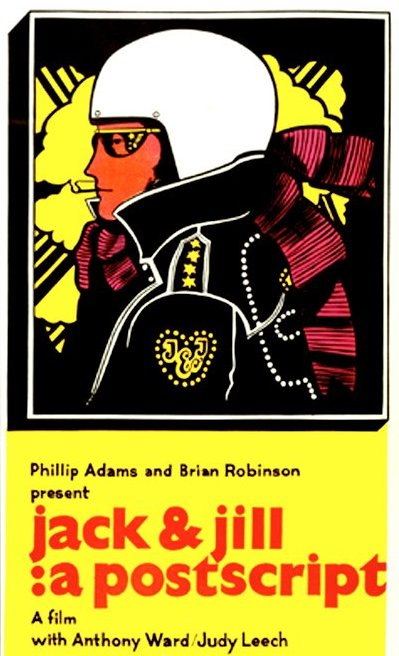

Jack and Jill: A Postscript (Phillip Adams, Brian Robinson, 1970) Melbourne, colour, 16 mm, 67 minutes, wr. prod. dp. Phillip Adams and Brian Robinson, music, Peter Best; Lindsay Howatt, Judy Leech, Anthony Ward; AFI Best Film 1969; kindergarten teacher falls for motorbike rider
Pike & Cooper:
Producer, Screenplay, Scenario, Script:, Photography, Editor: Phillip Adams, Brian Robinson. Music: Peter Best. Sound Supervisor: Alan Pay. Additional Sound: Philip Webster. 67 mins. 16mm. Cast: Anthony Ward (Jack Anderson), Judy Leech (Gillian O'Keefe), Lindsay Howatt (Christopher), Stanley Randall (Stan), Jean Higgs (Mrs Whelan), Phyllis Freeman (Mrs O'Keefe), Alan Higgs (Mr O'Keefe), Gerry Humphries (Gerry), Bob Cornish (television announcer), Gordon Rumph (minister), Sylvia Threlfall (minister's wife), Ray Watts (the singer), Claire Humphries-Hunt (go-go girl). Narrators: Rosemary Adams, Jim Berinson.
The long saga of the film's production began in 1964 when Phillip Adams and Brian Robinson devised the script for a series of brief sketches in which nursery rhymes provided ironic commentaries on modern suburbia. These episodes were later merged to form one continuous narrative, depicting, with shades of The Sentimental Bloke, the tragi-comic clash of two incompatible cultures, as represented by a bikie, Jack, and a kindergarten teacher, Jill. She lives quietly with her Catholic parents and has a mild-mannered boyfriend who takes her to church socials on his motor scooter. Jack rides a fierce, powerful motorbike, lives in squalid surroundings, and expects women to conform to his 'rudimentary moral structure'. The two meet at a church dance, which the bikies gate-crash, and as their relationship develops, they try in vain to involve each other in their own habitual pattern of existence. Jack wants to see Sexy Follies but Jill would rather watch Fellini; she takes him to the ballet and he takes her to the wrestling; but she cannot adapt herself to his 'slot-machine culture' and rejects his advances, with tragic results.
In the Australian, 30 March 1970, Adams described the five-year film-making marathon as 'an exercise in limitations', both in terms of finance and the technical expertise of the two-man production team. Surviving numerous problems – laboratory accidents, the demolition of chosen location sites, and changes wrought by time on various of the cast members who 'fell in love, went to gaol, got pregnant, committed suicide, divorced and defected' - the film was completed in mid-1969 for a total cost of $10,000. It proceeded to gather numerous prizes including a silver award in the Australian Film Awards in December 1969 and the second prize in a film competition conducted by the Festival of Perth in February 1970 (first prize ironically going to a solo short film by Brian Robinson, A Fine Body of Water). Reviews were also encouraging: Colin Bennett in the Age, 6 December 1969, wrote that the film was 'a rough blueprint for a really excellent feature marrying fiction and documentary. Sharply edged, full of refreshing ideas, character sketches and stabbing humor, it comes closer than most to seeing urban Australians as they are'. Despite the awards and the reviews, the film remained on the shelf until Adams and Robinson supplied 35-mm prints to Columbia, and it was given general release as a supporting film in a slightly abridged form, opening at the Metro, Bourke Street, Melbourne, on 29 October 1970.
By the time of its release, both Robinson and Adams had moved far beyond being enthusiastic amateurs. Robinson headed the film staff at the Swinburne College of Technology, Melbourne, and had made several short films of his own. Adams had become television critic for the Australian and begun a career as a satirical commentator on Australian society and culture. His articles appeared regularly in the Age, the Sydney Morning Herald and other Australian newspapers, and he also wrote extensively for television, including episodes of the revue The Mavis Bramston Show. He was also soon involved in film production on a more substantial scale with The Naked Bunyip (1970) and The Adventures Of Barry McKenzie (1972), and he became a key figure in the development of government support for the film industry. He had earlier been appointed by the Prime Minister, John Gorton, to an advisory committee to assist the government in the drafting of its film policy, and had made an extensive study of the film industries in Eastern and Western Europe and in North America. He subsequently served as foundation chairman of the Film, Radio and Television Board of the Australian Council for the Arts, and also as a foundation member of the Council itself. He was also chairman of the Australian Film Institute and an adviser to Don Dunstan, the Premier of South Australia on the establishment of the South Australian Film Corporation. In addition, he maintained a position as partner in a leading advertising agency in Melbourne, and after several years involved in the complex politics of the government arts bureaucracy, returned to feature production with Don's Party (1976).
Garry Gillard | New: 23 October, 2012 | Now: 19 May, 2022